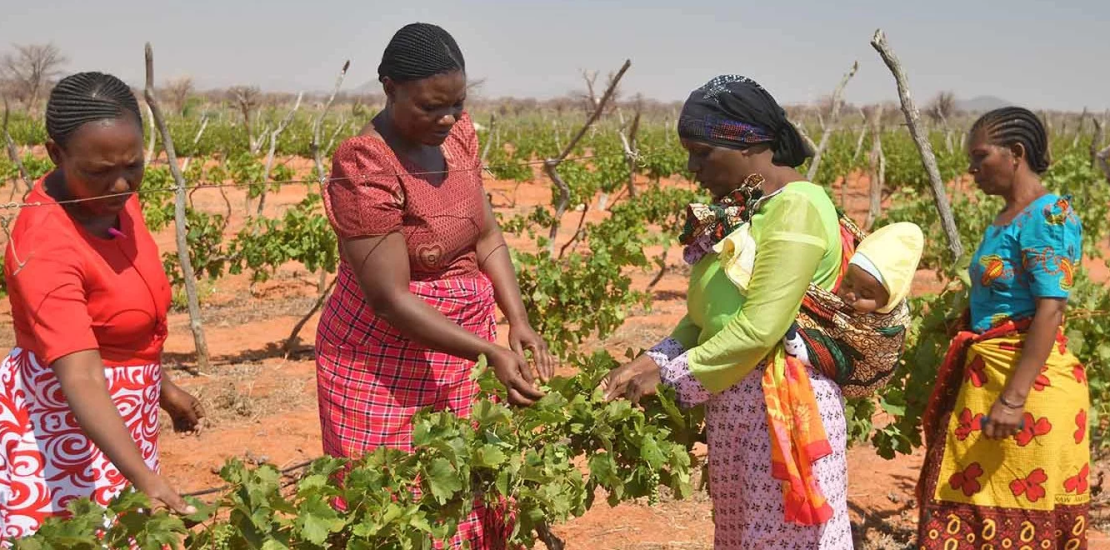Rural Women at the Heart of Nigeria’s Agricultural Renaissance
- October 15, 2024
- Posted by: Hub Admin
- Categories: Economic Development, Latest News & Events, Poverty Eradication

By Tine Bello & Oge Emodi
The Crucial Role of Rural Women in Nigerian Agriculture
In contemporary Nigeria, rural women play a vital role in the agricultural sector, serving as unsung heroes in the cultivation of food that sustains households, communities, and the nation. While their contributions often go unnoticed, rural women are the backbone of food security, cultivating diverse crops, preserving traditional farming techniques, and ensuring that local and urban markets receive fresh produce.
This year’s theme, “Rural Women Cultivating Good Food for All,” underscores how these women ensure the production of nutritious and sustainable food that benefits both local and global communities. Rural women in Nigeria are often at the heart of agricultural production, land management, and family sustenance. They are instrumental in enhancing the country’s food security, nutrition, and economic stability, despite numerous challenges faced.
Rural women are engaged in various aspects of food production, including tilling the soil, planting seeds, harvesting crops, and managing small-scale farms. They produce staple foods such as cassava, maize, yams, vegetables, and legumes, which form the foundation of Nigeria’s diet.
Challenges Faced by Rural Women Farmers
However, their contributions often remain unrecognised, and they frequently encounter barriers such as limited access to land ownership, agricultural inputs, and financial services. Cultural norms can further restrict their participation in decision-making processes, hindering their productivity.
Today, with the global focus on sustainable agriculture and food systems, rural women in Nigeria are crucial to achieving the nation’s food security goals. Their work contributes to ensuring that food is produced in a way that is both environmentally sound and accessible to all. They practice organic farming, reduce food waste by practicing post-harvest preservation, and use indigenous knowledge to adapt to changing climatic conditions.
Success Stories: Innovation and Resilience in Action

Despite these challenges, rural women in Nigeria have demonstrated remarkable resilience and innovation. Through community-driven solutions, they are overcoming barriers to improve food production, nutrition, and economic sustainability. Here are some inspiring success stories:
- Bintu Hassan from Kwara State recognised the growing demand for healthy, organic produce. Faced with limited access to chemical fertilizers and pesticides, she shifted her focus to organic farming. After receiving training supported by local NGOs, Bintu learned modern organic farming techniques that increased her yields. She now sells her vegetables at local markets, promoting healthy eating and inspiring about 50 other women in her village to adopt organic practices.
- In the conflict-affected region of Borno State, Amina Yusuf founded a grain cooperative after being displaced by insurgency. She rallied women in her community to pool resources for purchasing and storing staple grains like maize and millet. The cooperative has not only ensured a steady food supply but has also enabled members to sell surplus produce, reducing hunger and providing reliable income even in challenging circumstances.
- Kemi Adewale, a rice farmer in Ogun State, focused on reducing Nigeria’s reliance on imported rice. Through a women-led agricultural initiative, Kemi and her peers began cultivating high-quality local rice varieties using sustainable practices. Their efforts emphasize food sovereignty, ensuring local production meets community needs. By forming partnerships with government and private sector stakeholders, they expanded their operations and now supply rice to urban markets.
- Zainab Ibrahim from Kaduna State saw the untapped potential in the local shea nut industry. She organised a cooperative to process shea nuts into shea butter, providing women with skills and equipment. The cooperative has become a leading supplier of shea butter, exporting products to national and international markets, empowering over 150 women, and enhancing their families’ living standards.
These stories exemplify the transformative impact of rural women in Nigeria’s agricultural landscape. Their resilience and commitment to sustainable practices are critical in achieving food security, promoting nutrition, and driving economic growth.
Empowering Rural Women: A Path to Food Security and Sustainable Development
In light of contemporary developments in Nigeria, where the country is grappling with issues like urbanisation and the need for food self-sufficiency, empowering rural women in agriculture is key. Policies that focus on providing rural women with the necessary support such as access to finance, training in modern farming techniques, and inclusion in agricultural policy formulation are essential for fostering a resilient food system that benefits all Nigerians.
As we celebrate the International Day of Rural Women 2024, it is crucial to continue to support women by prioritising policies that promote equitable land rights, enhance access to technology, and provide agricultural training on modern farming techniques, strengthening market linkages and ensuring access to health and social services, strengthening policy and legal frameworks that protect rural women’s rights and promote their inclusion in decision-making processes at all levels. These include advocating for gender parity in agricultural programmes, land reforms, and development initiatives.
Supporting rural women is not just about improving agricultural productivity; it is about creating resilient, sustainable food systems that benefit everyone. When rural women are empowered with access to resources, education, and markets, they can play a pivotal role in nurturing a sustainable agricultural future for Nigeria. Encouraging these will empower rural women to cultivate nutritious food for their communities, and contribute to national and global food security.
